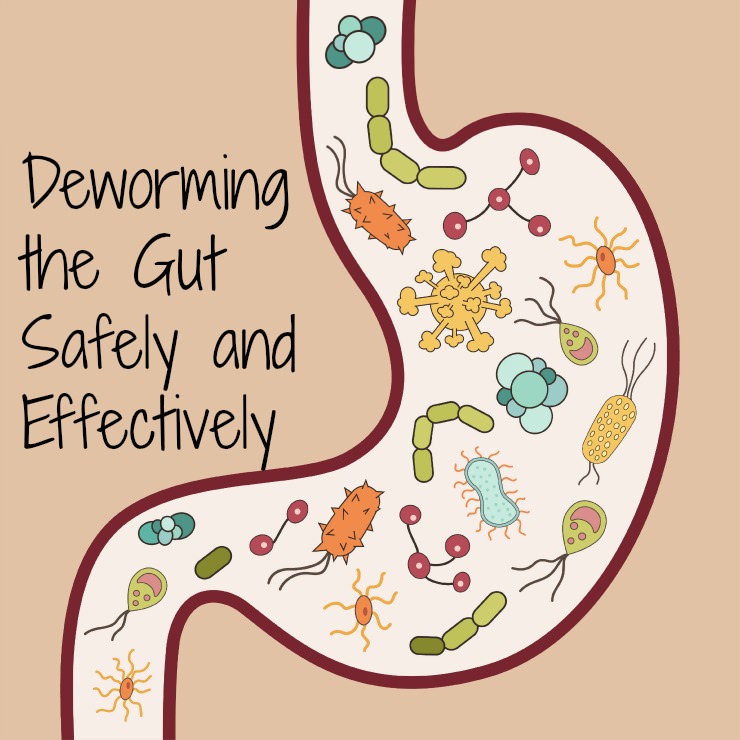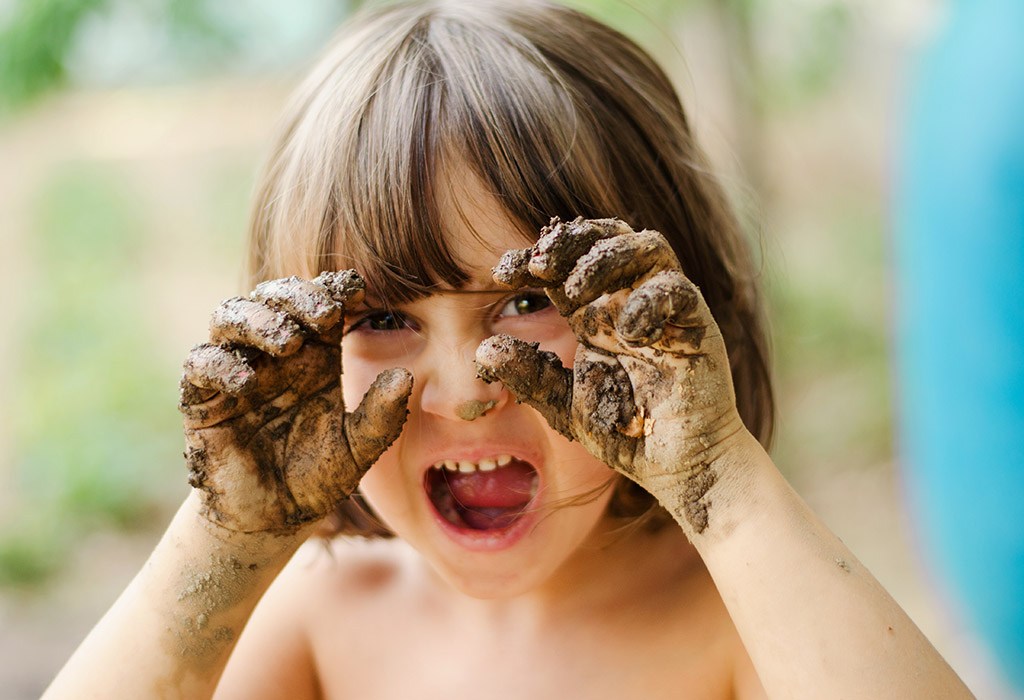
Getting dirty is part of childhood. But in developing countries like India playing in dirt can put kids at risk of contracting parasitic worm infection.
It can be transmitted from someone else, while walking barefoot on infected soil, playing in the contaminated water or eating unclean food.
Helminth infection (commonly known as soil-transmitted helminths) often causes serious health problems that impact a child’s growth rate and increase the risk of malnutrition.
“Does your child complain of severe stomach ache, on and off vomiting associated with a gradual weight loss?”
If yes, then maybe there is an infestation of worms in your baby’s intestine. In some cases, teeth grinding is also suspected as a sign of worm infection. However, the research is conflicting on this subject.
How did my child get worms?

1) Infected Soil: If an infected person defecates in the soil, they deposit worm eggs which then grow into larvae. Children walking barefoot or crawling on this soil get infected as these larvae can penetrate the skin of the feet. These larvae can also get into the body through dirty nails.
2) Infected Water: Some worms breed in water bodies. These are typically found in areas where sanitation is an issue. Playing, bathing or drinking untreated water can lead to a worm infection.
3) Infected food: Hookworm, whipworm and roundworm eggs stay on plants and vegetable when grown on contaminated soil. These vegetables when not washed or cooked properly can cause worm infections. Fishes in such contaminated water bodies also get infected and may carry worms. Consuming them raw or without proper cooking can contract infections.
4) Direct contact with the infected person: This typically occurs in case of infants or kids where if someone your baby is in contact with has worm infection. Worm eggs can remain under the nails and can pass on from there to toys, vessels, clothes or even directly to your baby’s mouth. Pinworm, in particular, can pass on to kids when proper hygiene is not maintained while threadworm can live up for three weeks in bed sheets or clothing.
What Happens in a worm infection?
Worm infections in kids and toddlers are common and spread very easily. However, it is very difficult to know how prevalent these diseases are as most of them lack symptoms and aren’t reported. Studies suggest that one in five individuals, living in India has at least one type of worm infection, and the numbers are quite high in case of children. Pinworms also also known as threadworms are the most common in children, but it can also affect individuals of any age. They look like pieces of thick thread, about 3mm to 10mm long. Hookworms, roundworms and whipworm infections are the other prevalent types that are also common in India.
Threadworms are caught when someone swallows the worm’s eggs. Once infected, these worms live and breed mostly in the bowel (intestine). From there it then travels out through the anus (back passage) to lay their eggs on the skin there at night time. The eggs may be picked up on the fingers and transferred to the mouth if the child scratches their bottom or doesn’t wash their hands after going to the toilet. These eggs can also fall off into bedding, clothing or may be wafted into the air settling on various surfaces at home or school. They survive on any surface for two weeks or more and can easily be picked up and cause infection in other people.
How worm infections affect you?
In most of the cases, a worm infection goes unnoticed as the symptoms are not very evident; hence it’s important to undergo deworming treatment once in every six months, even if you don’t have worms, just to be safe.
Worm infection if left untreated can lead to many complications such as anaemia, intestinal bleeding, cysts growing in brain etc. It leads to malnutrition, weight loss and a weak immune system which makes them vulnerable to various illnesses. A long-term infection can affect your child’s physical and intellectual development delaying growth and cognitive functions.
Phases of Worm Infection:
Incubation Phase: This is the period between becoming infected and developing symptoms
Infection Phase: Spread is possible as long as worms are present in the body.
Signs and Symptoms of Worm Infection
If your baby has a mild infection of threadworms, she may not show any symptoms, apart from complaining of an itchy bottom, particularly at night. Below are a few other symptoms that can be seen in some cases:
• Pain in stomach
• Weight loss
• Nausea
• Blood in stool
• Itching
• Rashes
• Vomiting or coughing
• Itching or pain around the anus
• Urinary tract infection
• Internal bleeding leading to anaemia, malabsorption of nutrients
Treatment
Worm infections are treated with oral medications. Deworming allows absorption of critical nutrients needed to be and stay healthy. A single dose therapy is usually effective and is given to the infected person based on the type of infection. Kids expel worms through nose mouth or via stool often as early as next day. Your doctor may also prescribe iron supplement in case of anaemia. Deworming tablets when paired with Vitamin A doubles the impact.
It is advised not to buy over the counter medication for kids below two years of age. Also, it is better to talk to your doctor before starting on any herbal medicines for deworming. Since worm infections spread easily getting re infection is quite common. Hence doctor may advise all the members of the house to undergo treatment, just to be safe.
Natural remedies Methods
1) Papaya Seeds: It is believed that papaya seeds contain benzylisothiocyanate, benzylglucosinolate, glucotropacolin, benzylthiourea, hentriacontane, sitosterol, caricin and an enzyme called myrosin. These seeds can be eaten whole or can be powdered which ca then be consumed with yoghurt.
2) Pineapple: Pineapple contains bromelain that is believed to combat tapeworms by removing the free radicals the worm produces.
3) Banana with Lemon Juice: Banana is a natural laxative and contains oligosaccharides that stimulate the intestine to contract, lemon has antibacterial, antiprotozoal properties that help kill parasites.
4) Pumpkin Seeds: Pumpkin seeds contain cucurbitacins which paralyze the worms in your body by attacking their nervous system, which causes them to stop growing and eventually die. You should eat at least 10 to 15 pumpkin seeds a day.
Prevention
WHO recommends that preschool children should receive regular deworming treatment, which is once in every six months after she turns one. Once your kid starts to walk, make sure you speak to your paediatrician for the deworming sessions.
Below is a list of things that you can take care at home to avoid worm infection:
1) Wash your hands properly after you change your kid’s diapers
2) Use a good disinfectant to clean the house
3) Refrain from using slippers at home when your kid is at crawling stage
4) Once your child can walk, make sure she wears a closed shoe when while playing outside. Also, wash her hands and feet post her play time.
5) Refrain your child from playing on moist sand pit and soil.
6) Do not let your child play near water bodies
7) If your child is old enough, teach her to wash her hands after going to the toilet every time.
8) Keep your child’s nails short and clean
9) Wash the fruits and vegetables thoroughly before cooking. Special care is needed while cooking leafy greens. Wash them multiple times in ample amount of water.
10) Cook meat and fish properly before consuming.
11) If you have a baby sitter or ayah looking after your baby, it is best to get her dewormed along with the family members.
Take Away message
1) Not only children but adults too are prone to worm infestations.
2) Worms enter the body due to lack of hygiene
3) Roundworm, tapeworm and hookworms are the three most common type of worm infection.
4) Lacks of appetite, tiredness, anaemia, loose bowels, vomiting are a few common signs of worm infections.
5) Kids require deworming once in six months
6) Do not self-medicate, consult your doctor before you start on any medicines for deworming.
For booking appointments, call us @ +91-80-49261111, +91-80-67458111 (or)
Download RxDx Smart Healthcare App Now!!!




